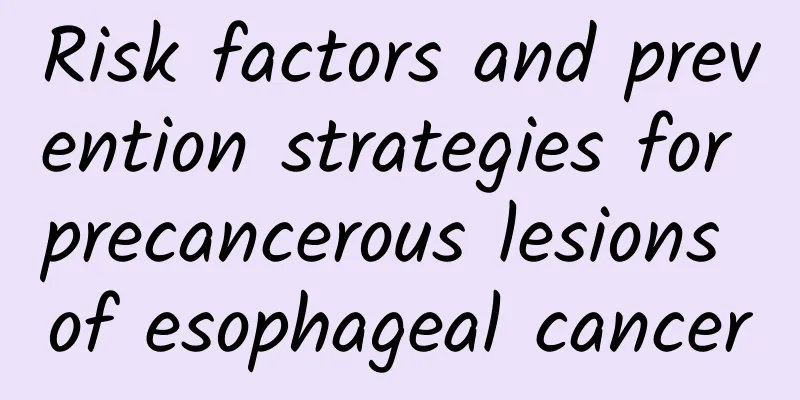Risk factors and prevention strategies for precancerous lesions of esophageal cancer

|
Esophageal cancer is a malignant tumor that seriously endangers human health. Its incidence is often closely related to multiple factors. Precancerous lesions are an important stage in the development of esophageal cancer. Understanding their risk factors and taking effective preventive strategies are of great significance for reducing the incidence of esophageal cancer. 1. Bad eating habits are one of the main risk factors for esophageal precancerous lesions. Bad eating habits such as pickled food, moldy food, hot food, high-salt diet and fast eating may increase the risk of esophageal cancer. In addition, the study also found that the quality of drinking water may also affect the incidence of esophageal cancer and precancerous lesions. Therefore, improving eating habits and ensuring the quality of water sources are important measures to prevent esophageal cancer. 2. Genetic factors play an important role in the occurrence of esophageal cancer. Esophageal cancer has a certain family clustering. Individuals with first-degree relatives suffering from esophageal cancer have a significantly increased risk of esophageal cancer. Genetic factors play an important role in the occurrence and development of esophageal cancer. Different genetic susceptibility loci have different effects on the risk of esophageal cancer. Therefore, for people with a family history of esophageal cancer, more attention should be paid to the prevention of esophageal cancer. 3. Bad living habits are also one of the risk factors for esophageal precancerous lesions. Smoking and drinking are risk factors for esophageal cancer. Long-term smoking and heavy drinking will increase the risk of esophageal cancer. Therefore, quitting smoking and limiting alcohol consumption are important measures to prevent esophageal cancer. In response to the above risk factors, we can adopt a series of prevention strategies to reduce the risk of esophageal cancer. First, improve eating habits, reduce the intake of pickled, moldy, high-salt and other foods, and avoid overheating and eating too fast. Secondly, increasing the intake of fresh vegetables, fruits, dietary fiber and dietary calcium can help reduce the risk of esophageal cancer. In addition, people with a family history of esophageal cancer or bad living habits should undergo regular esophageal cancer screening to detect and treat precancerous lesions as early as possible. In short, there are many risk factors for esophageal precancerous lesions, and we should adopt effective prevention strategies for these risk factors to reduce the risk of esophageal cancer from the source. |
<<: Follow-up and treatment principles of esophageal precancerous lesions
>>: Endoscopy doctor, talk about your personal experience of bowel preparation
Recommend
Can I eat soybeans during menstruation?
We all know that soybeans have high nutritional v...
Can ozone be used to treat mold?
If things are placed in a dark and humid environm...
Backache, abdominal distension, delayed menstruation
Symptoms such as lower back pain, abdominal diste...
Don't do these 4 "eye-damaging" behaviors! If you don't pay attention, your eyes will really be "scrapped"
Reading reminder: This article contains 12 pictur...
Is it painful to have an artificial abortion at two months?
Many couples or lovers become pregnant without do...
What are the symptoms of vulvar leukoplakia cancer?
The incidence of vulvar leukoplakia has been incr...
No bleeding the next day after abortion
Is it normal to have no bleeding on the second da...
Can folk remedies cure presbyopia and cataracts? Don’t believe it!
As they age, many elderly people cannot avoid suf...
Pictures of cervical obstruction
The cervix is an important part of a woman'...
What is the cause of lower abdominal pain and abnormal leucorrhea?
Lower abdominal pain and abnormal leucorrhea can ...
What is the reason for the dull pain in the left lower abdomen of a woman?
In today's social life, some female friends h...
SensorTower: Top 10 most downloaded mobile apps worldwide in August 2020
Sensor Tower Store Intelligence data shows that D...
How to use sweat steam to treat irregular menstruation
There are generally many ways to treat irregular ...
This kind of pear is strongly recommended to be eaten by "sucking".
Autumn is a good time to eat pears. There are man...
Risk factors and prevention strategies for cervical precancerous lesions
Cervical cancer is a common malignant tumor in wo...









